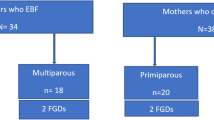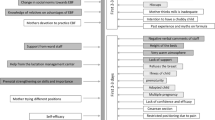Abstract
The purpose of this study is to better understand Nutritionist-Dietician opinions concerning WIC Program strategies to promote breastfeeding in Puerto Rico. Four groups of nutritionists-dietitians were recruited to take part in focus group discussions. Each focus group lasted for approximately 1 h and the researchers completed a debriefing sheet after each meeting. The group discussions were taped and transcribed. The participants identified hospital barriers, lack of family support and problems related to the mother as the three principal reasons that Puerto Rican mothers do not breastfeed their babies or stop breastfeeding early. An individual meeting was the most frequently mentioned WIC strategy that was meant to convince mothers to breastfeed their infants. Nevertheless, the focus group participants recognized that the effort and time available for such meetings is limited. From these groups, one theme that emerged is that the WIC Program in Puerto Rico should collaborate with hospitals to arrange for WIC-sponsored nutritionist-dietitians to visit the WIC participants during their maternity hospital stay, and in their homes.
Similar content being viewed by others
References
Parrilla-Rodríguez, A., & Gorrín-Peralta, J. J. (2008). La lactancia materna en Puerto Rico: patrones tradicionales, tendencias nacionales y estrategias para el futuro. Puerto Rico Health Sciences Journal, 27(1), 49–54.
Becerra, J. E., & Smith, J. C. (1990). Breastfeeding patterns in Puerto Rico. American Journal of Public Health, 80(6), 694–697.
Departamento de Salud. (2002). Estudio de Salud Materno Infantil de Puerto Rico (ESMIPR): Datos sobre lactancia.
United States Department of Agricultura [USDA] (n.d.). (2008). Special supplemental nutrition for women, infants, and children [WIC] Program. Retrieved December 13, 2008 from http://www.fns.usda.gov/wic/Breastfeeding/breastfeedingmainpage.HTM.
Naylor, A. J. (2001). Baby-friendly hospital initiative, protecting, promoting, and supporting breastfeeding in the twenty-first century. Pediatric Clinics of North America, 48(2), 475–483. Review.
Phillip, B. L., Merewood, A., Millar, L. W., et al. (2001). Baby friendly hospital initiative improves breastfeeding rates in a US hospital setting. Pediatrics, 108, 766–768.
Pinelli, J., McGovern, M., Edward, M., et al. (2001). Evaluation of breastfeeding protocol. Journal of Human Lactation, 9, 223–230.
Kovach, A. C. (1996). An assessment tool for evaluating hospital breastfeeding policies and practices. Journal of Human Lactation, 12, 41–42.
Sinusas, K., & Gagliardi, A. (2001). Initial management of breastfeeding. American Family Physician, 64(6), 981–988. Retrieved December 14, 2008 from http://www.aafp.org/afp/200109115/981.htm.
Riva, E., Banderali, G., Agostini, C., et al. (1999). Factors associated with initiation and duration of breastfeeding in Italy. Acta Paediatrica, 88, 411–415.
Scrimshaw, S. C., Engle, P. L., Arnold, L., et al. (1987). Factors affecting breastfeeding among women of Mexican origin or descent in Los Angeles. American Journal of Public Health, 77(4), 467–470.
Baumslag, N., & Michels, D. L. (1995). Milk, money, and madness: the culture and politics of breastfeeding (1st ed.). United States of America: Greenwood Publishing Group Inc.
Dennis, C. L. (2002). Breastfeeding initiation and duration: a 1990–2000 literature review. Journal of Obstetric, Gynecologic, and Neonatal Nursing, 31(1), 12–32. Review.
Hoddinott, P., & Pill, R. (2000). A qualitative study of women’s views about how health professionals communicate about infant feeding. Health Expectations, 3(4), 224–233.
de Montigny, F., & Lacharité, C. (2004). Fathers’perceptions of the immediate postpartal period. Journal of Obstetric, Gynecologic, and Neonatal Nursing, 33(3), 328–339.
Sullivan, M., Leathers, S., & Kelley, M. (2004). Family characteristics associated with duration of breastfeeding during early infancy among primiparas. Journal of Human Lactation, 20, 196–205.
Association of Women’s Health, Obstetric and Neonatal Nurses. (2002). Fathers & Breastfeeding 2002; 6: 325–331.
Pollock, C., Forest, R., & Giarratano, G. (2002). Men of diverse cultures: knowledge and attitudes about breastfeeding. Journal of Obstetric, Gynecologic, and Neonatal Nursing, 31(6), 673–679.
Arora, S., McJunkin, C., Wehrer, J., & Kuhn, P. (2000). Major factor influencing breastfeeding rates: mother’s perception of father’s attitude and milk supply. Pedriatrics, 106, 67–71.
Bentley, M., Caulfield, L., Gross, S., Bronner, Y., Jensen, J., Kessler, L., et al. (1999). Sources of influence on intention to breastfeed among African-American women at entry to WIC. Journal of Human Lactation, 15, 27–34.
Sharma, M., & Petosa, R. (1997). Impact of expectant fathers in breastfeeding decisions. Journal of the American Dietetic Association, 97(11), 1311–1313. Review.
Jordan, P., & Wall, V. (1993). Supporting the father when an infant is breastfed. Journal of Human Lactation, 9, 31–34.
Zimmerman, D. R. (1999). You can make a difference: increasing breastfeeding rates in a Inner-City Clinic. Journal of Human Lactation, 15, 217–220.
Reifsnider, E., & Eckhart, D. (1997). Prenatal breastfeeding education: its effect on breastfeeding among WIC participants. Journal of Human Lactation, 13, 121–125.
Izzat, S. D. (1997). Breastfeeding counseling by health care providers. Journal of Human Lactation, 13, 109–112.
Couto de Oliveira, M. I., Bastos Camacho, L. A., & Tedstone, A. (2001). Extending breastfeeding duration through primary care: a systematic review of prenatal and postnatal interventions. Journal of Human Lactation, 17, 326–340.
Grummer-Strawn, L. M., Rice, S. P., Dugas, K., et al. (1997). An evaluation of breastfeeding promotion through peer counseling in Mississippi WIC clinics. Maternal and Child Health Journal, 1(1), 35–42.
Botello Cabrera, M. T., Marin, H., & Vera, M. (1999). Factores Asociados al inicio, tipo y duración de la lactancia materna entre participantes y no participantes a charla prenatal de educación en lactancia materna de una institución hospitalaria. Puerto Rico Health Sciences Journal, 18(3), 241–249.
Mattar, C. N., Chong, Y. S., Chan, Y. S., Chew, A., et al. (2007). Simple antenatal preparation to improve breastfeeding practice: a randomized controlled trial. Obstetrics and Gynecology, 109(1), 73–80.
Arthur, C. R., Sanz, R. B., & Reploge, W. H. (2003). The employment-related breastfeeding decisions of physician mothers. Journal of the Mississippi State Medical Association, 44(12), 383–387.
Saha, P. (2002). Breastfeeding and sexuality. Professional advice literature from the 1970s to the present. Health Education and Behavior, 29(1), 61–72. Review.
Morrison, L., Reza, A., Cardenes, K., et al. (2008). Detarminants of infant feeding choice among young women in Hilo, Hawaii. Health Care for Women International, 29(8), 807–825.
Acknowledgments
Thanks to Doctor Miriam Labbok from Department of Maternal & Child Health, The University of North Carolina at Chapel Hill for reviewed the final draft of this article.
Source of Funding
This study was not funded by any private or public organizations.
Conflict of Interest
There are no conflicts of interest.
Author information
Authors and Affiliations
Corresponding author
Rights and permissions
About this article
Cite this article
Ruiz, M.V., Arroyo, H., Dávila Torres, R.R. et al. Qualitative Study on WIC Program Strategies to Promote Breastfeeding Practices in Puerto Rico: What do Nutritionist/Dietician’s Think?. Matern Child Health J 15, 520–526 (2011). https://doi.org/10.1007/s10995-010-0592-9
Published:
Issue Date:
DOI: https://doi.org/10.1007/s10995-010-0592-9




